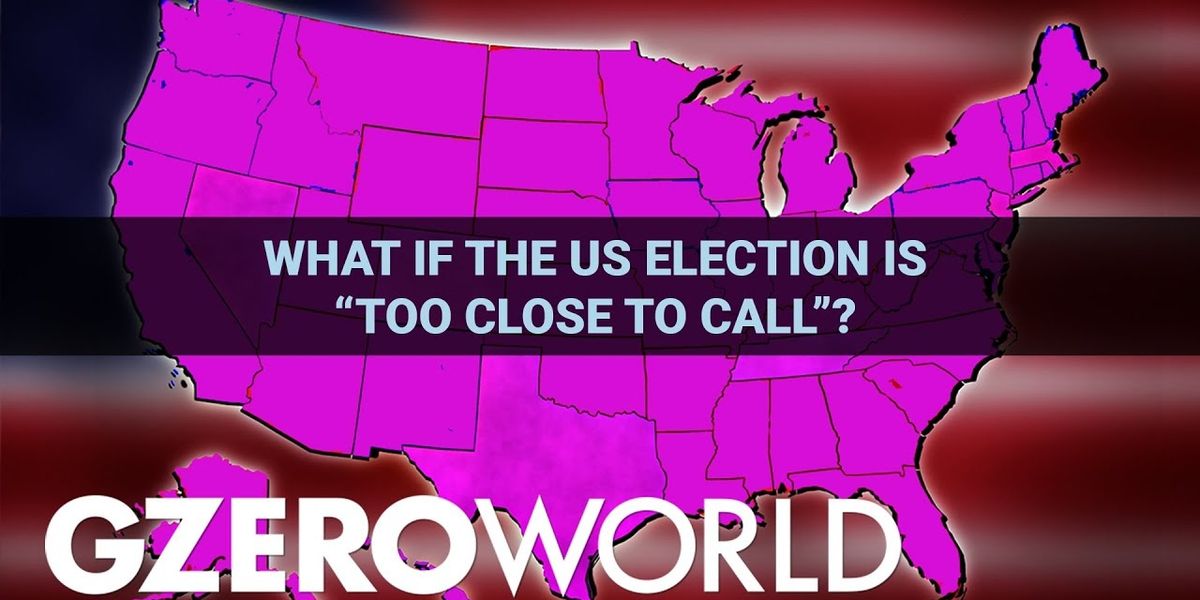Trending Now
We have updated our Privacy Policy and Terms of Use for Eurasia Group and its affiliates, including GZERO Media, to clarify the types of data we collect, how we collect it, how we use data and with whom we share data. By using our website you consent to our Terms and Conditions and Privacy Policy, including the transfer of your personal data to the United States from your country of residence, and our use of cookies described in our Cookie Policy.
{{ subpage.title }}
Aubrey and Taylor Endicott cast their votes while their children, from left, Sterling, 5, Adelaide, 3, and Lincoln, 7, wait patiently under the voting tables at Shawnee Heights Middle School on Tuesday, Nov. 5, 2024.
What to expect when the US is expecting
In making her final pitch to American voters before 75,000 attendees on the National Mall, Vice President Kamala Harris closed by declaring: “The United States of America is the greatest idea humanity ever devised.” While undoubtedly hyperbolic, Harris’ remarks point to the heart of what is at stake in the US election: For the US and other countries with elected leaders, Tuesday’s election represents a referendum on the future of democracy. Will it come away battered, or will it remain intact?
Harris hopes American voters place system over self – rights over kitchen table issues. Only with hindsight will her campaign find out whether this was a winning strategy.
Still, one of Europe’s most frequently repeated questions about the US election is whether we will see a repeat of Jan. 6, 2021. Watching Americans climb their Capitol building shocked the international audience. While observers abroad may not fully agree with Harris’ declaration, seeing the fissures in the US democratic system laid bare that Wednesday in January shifted perceptions of what was possible in America. If the US could come under attack from within, where next? If the US could not uphold its democratic promise, who could?
Although many Americans have hoped to tuck aside the storming of the US Capitol as a 2020 election “one-off,” the sentiment of that day has lingered. Former President Donald Trump and his running mate, Sen. JD Vance, routinely claim that the 2020 election was stolen and that Trump never lost. At a Pennsylvania rally over the weekend, Trump lamented that he “shouldn’t have left” office in 2020. Three years after the Jan. 6 riot, polling found that roughly two-thirds of Republicans still did not believe President Joe Biden was legitimately elected, a proportion that has grown since 2021.
According to the Brennan Center for Justice, “extensive research reveals that fraud is very rare, voter impersonation is virtually nonexistent, and many instances of alleged fraud are, in fact, mistakes by voters or administrators.”
Yet, at his final major rally at Madison Square Garden, Trump warned his supporters, “We must defeat Kamala Harris and stop her radical left agenda with a landslide that is too big to rig.”
This leaving open the door to the risk of fraud, a stolen election, and “a rig” – whether valid or not – makes clear that should Trump lose when all the votes are counted, he will not go quietly. Nor will his supporters.
Trump is right to point out that the margin of victory this week will be pivotal for what happens next. Democracy is a system in which groups lose elections and accept the election results. Losers consent to being losers in any given election because they believe they will have the opportunity to participate in the next cycle. Losers withdraw this consent, however, when they come to believe that the institutional framework will not allow them to become winners – the system is rigged against them.
With the 2020 election still so salient, Trump and his supporters are primed to interpret any small loss in today’s election as evidence of the big rig. A narrow margin of victory that delivers Harris 270 electoral college votes likely represents the most volatile outcome of today’s election. For those forces unleashed in 2020 and still itching for a fight, a small Harris victory – perceived by them as improbable – is an easy mark. A wide margin of victory for Harris presents its own potential for criticism, especially as both aggregate national and swing state polling have consistently been so close. But should Harris pull off a meaningful polling surprise, it may suck the air out of the fraud argument and deflate the Trump world.
Given that Trump is not currently president and does not hold the reins of office, a replay of Jan. 6 is remote, but a flood of legal cases and calls for recounts is certain. Disturbances at courthouses and state government buildings should also be expected. Challenges within Congress around vote certification, especially should Republicans retain the House and regain the Senate, will be set in motion. And where there is disaffection, as there is in this post-pandemic, hyper-polarized political moment in the US, political violence cannot be ruled out.
We are in for a wild finish. What happens between today and the full results, and between the full results and Inauguration Day, Jan. 20, 2025, will be fluid. Many ideas are at stake, not the least of which is the foundational idea of democracy itself. As the US votes, the world holds its breath.
Lindsay Newman is a geopolitical risk expert and columnist for GZERO.
editsharetrending_upHow should the media handle election night?
"It's very important that if the election is very close and it comes down to say those Midwestern states, which are going to count their ballots slow, that the message is, 'too early to call.'" Election law expert Rick Hasen weighs in on how the media – both traditional outlets and social media – should handle election night coverage. His conversation with Ian Bremmer is part of the latest episode of GZERO World.
Watch the episode: What could go wrong in the US election? Rick Hasen on nightmare scenarios & challenges
